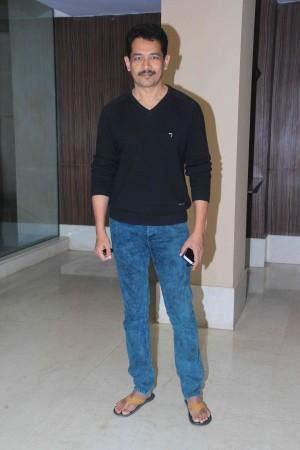
Atul Kulkarni is elated with the success of his recent film The Ghazi Attack, a war drama, directed by Sankalp Reddy, in which he played the role of an executive officer, Devraj on board the Indian Navy submarine as it goes on a mission to stop PNS Ghazi in the wake of the 1971 Indo-Pak war.
Also read: Interview: Rana Daggubati reveals a similarity between Baahubali 2 and The Ghazi Attack [VIDEO]
In January this year, he appeared alongside Shah Rukh Khan in Raees. The roles are quite different from each other and over the years, Atul Kulkarni has made a name for himself by playing quite a few serious roles. "Why call them serious roles? There's a lot of variety in what I've done over the years. I guess the media should find new words to describe the nuances of actors' performances than just categorising them as serious or comic roles. There's a lot more to that than what you can think," he quips.
The more you talk to him, the more you begin to understand his deep love for his profession and life itself. Excerpts from an interview:
Congratulations for the huge success of Ghazi. You must be quite thrilled about how the film has been received. Did it come as a big surprise for you that the audience had embraced it?
Of course, I am thrilled that the film has done well. Ghazi was an extremely difficult film to make considering the constraints we had to operate in during the shoot. Since we were shooting inside a submarine set, we had to adapt to the space constraints, camera movements and even the lighting was quite different.
If you think about all this, the film doesn't have anything which are considered essential to make a successful film from a box-office point of view. There are no songs and there's no comedy. The fact that a film like this got made is a big achievement in itself and for that, we must give the credit to the producers -- Niranjan Reddy and Prasad V Potluri -- for putting together the project. They didn't compromise at all and walked the extra mile to assemble a great crew to help a first-time director like Sankalp. That's the reason why the film looks so good.
It's interesting that you talk about the space constraints. One of the things that we noticed during the film is how it draws our attention to the actors because a big part of the drama unfolds during the interactions between the characters. Did it have an impact on your acting as well?
(Laughs) It's a cumulative effect of a lot of factors I suppose. The decisions you make, initially, are quite abstract and it's difficult to analyse the process in that sense. I've been acting in films for more than 15 years now and thanks to that experience, I kind of take some sub-conscious decisions about how I'm going to enact a scene. Moreover, our interactions with the co-stars play a major role in deciding how a scene is going to unfold on screen. Niranjan Reddy, one of the producers, said something very interesting that, despite the setting, the film didn't feel claustrophobic because people were quite focused on the actors. A good screenplay and camera movements also played a major role in making the whole film quite engaging. This isn't a war film where there's plenty of action on the
A good screenplay and camera movements also played a major role in making the whole film quite engaging. This isn't a war film where there's plenty of action on the battlefield and we are supposed to convey all the tension only through our expressions. The best part is that there was no clash between how I approached a scene compared to how Kay Kay Menon or Rana Daggubati approached it. We complimented each other. And that made a huge difference.
Talking about acting, what was the process like during the shoot. Did you get ample time to rehearse every single scene or was it a very instinctive process during the shoot?
It was quite an elaborate process and everything was planned to the last detail. Every morning before we got our make-up done, we would gather on the set to perform the whole scene without any cameras. Director Sankalp Reddy and cinematographer Madhie would note our movements and then plan how to set up the camera. This process helped us a
This process helped us a lot because, on the set, Madhie who handled the cinematography.
For some reason, it feels like Kay Kay Menon and you come from the school of approaching your work. Would you say that you two have a similar style when it comes to acting?
I would say that there are as many methods of acting as many actors there are in the world. No two actors act in the same way and that's because we have different personalities. And our personality keeps changing according to the changes in our lives. Our philosophy and principles of life keep changing from time to time and it'll reflect in our acting. It's a very dynamic process. Maybe from the outside, it might seem that we have a similar style of acting, but that's not true at all.
So, what's the philosophy in your life that's guiding you at the moment?
I've come to a conclusion that my life is more important than my profession. Acting in films is just a part of my life, not my life itself. I've been thinking about this for a while. From a seed, it has grown into a tree now. There are many other things that I'm interested in right now. Reading a newspaper is as important as reading a script. I also take travelling, working for my NGO, spending time with my dogs as seriously as I take my films. That's where I'm right now. When you are an actor, nothing is in your hands. We can only choose from films offered to us. You are as good as the script or a role offered to you.
Tell us more about your NGO - Quest. We've heard that it's into improving the quality of education. Isn't it?
Yes. 'Quest' works in a lot of verticals, but our focus is on primary and pre-primary education. And we work with the system where we are trying to work with the Zilla Parishad schools. Right now, we are operating in five districts in Maharashtra and we based in Sonale village in Wada taluka.
You recent said that it gives you a lot of hope that cinema is constantly changing. Is it the best time to be making films?
Oh yes! My point is - Could we have imagined a Ghazi 6 years ago? Nobody would have thought about it. Even today, people are surprised that we've made the film. We have other films like Pink, Neeraja, Airlift, A Wednesday to name a few. And who would have thought that female-centric films like Queen and Kahani would collect so much money? I'm thrilled that such films are being made. Cinema is an expensive art form and unless it is supported by the audience, it can't go far. V Shantaram used to say that cinema is 80 percent business and 20 percent art. Until the business works, the art can't sustain.
On the other hand, I hate it when people crib about blockbuster commercial films and how they don't have content. People don't understand the demographic situation of India. It depends on a lot of factors like socio-economic situation, education among other things. And to say that one style of cinema is bad compared to others is a wrong way of looking at things. You've to understand that it's because of blockbuster films that our infrastructure is improving. We better respect that there are different demands of different cultural zones. I sincerely believe that all kinds of cinema - be it commercial cinema or art house cinema - has to thrive. And this is the right time to make a film you want to make and reach out to a wider audience.















